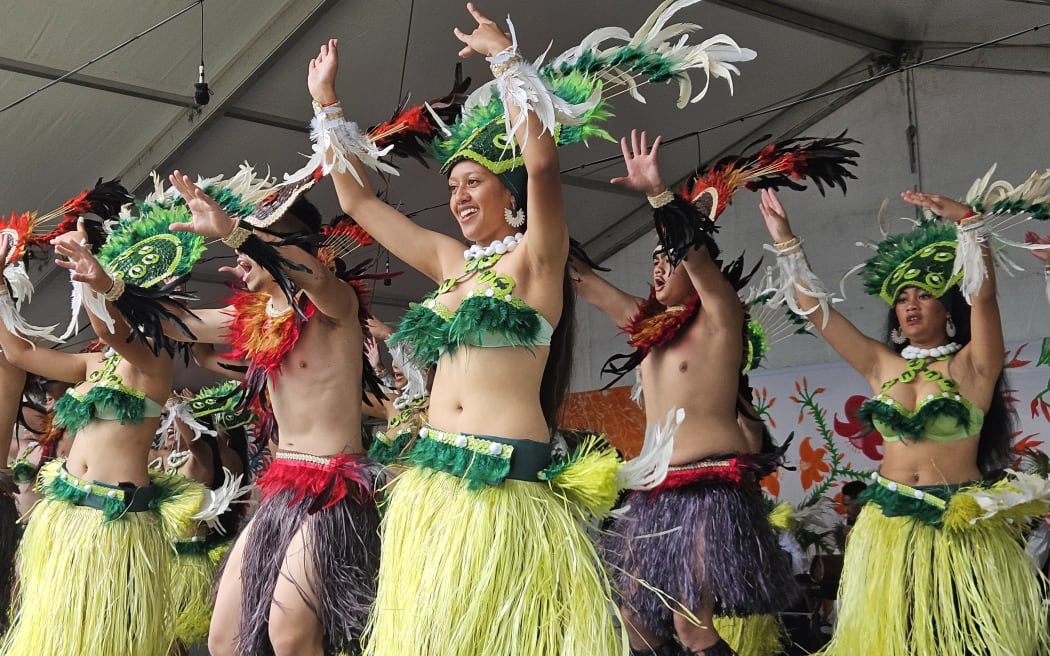Cook Islander at heart of world’s biggest school cultural show
Saturday 30 March 2024 | Written by Supplied | Published in Art, Entertainment, Features

Cook Islands performers at the Auckland Polyfest 2024. Photo: RNZ Pacific / Tiana Haxton. 24032882
As the dust settled at the Manukau Sports Bowl at the end of the ASB Polyfest last week in Auckland, four women, including a Cook Islander, finally breathed a sigh of relief.
Months of planning, sleepless nights and tireless effort to put together another successful festival came to end for the hundreds of volunteers, and organisers like Tupou Manapori, Mele Ah Sam, Fane Fusipongi Ketu’u and Seiuli Leo-Mau’u.
Polyfest, now in its 49th year, has become a beacon of cultural awareness for young Pacific children growing up in New Zealand.
Cook Islander Tupou has been there since its inception.
Fondly known as Mama Tupou, the 80-year-old was a teacher at Hillary College (now known as Sir Edmund Hillary Collegiate) in 1976, and was one of the pioneers of Polyfest.
She can't believe the festival has grown to be the biggest secondary school cultural competition in the world.
“And we started small, just four schools ... on a rugby field.”
Tupou said they were lucky to have had the support of four Pākeha principals of Hillary College, Māngere College, Seddon High School (now known as Western Springs College) and Aorere College.
“They
weren’t from the Pacific, didn’t know our ways or protocols, but they
recognised how important and valuable it was for the children.’
At that time, Tupou was a home economics teacher, in cooking and textile.
When it started, Polyfest had just six groups from the four participating schools, and 40 performers.
Different schools hosted the festival each year after that, until it moved to its permanent home in 1996 at the Manukau Sports Bowl.
“It’s a legacy I am very proud of. I am very passionate about language and culture and I wanted the children I taught to always have that with them, even being far away from the islands.”
Now a Cook Islands language lecturer at MIT, Tupou continues to be a part of Polyfest as the Cook Islands stage coordinator.
She laughs when she talks about her years of involvement.
“Every year I say it will be my last, but every year they call me, and I say yes.
“I still have a lot to offer. So, as long as I can, I will continue to do this because I know how important Polyfest is for the culture.”
Ketu’u shares this passion.
For the past nine years at every festival, she’s been the first person on the Tongan stage, and always the last to leave.
She’s been the stage coordinator for the Tongan stage since 2005, but was first involved in 2003.
“I’m here 5am, making sure everything is ready. This year, we had 37 groups performing on the Tongan stage,” Ketu’u said.
Ketu’u said making sure everything runs on time was always her top priority.
Last year there was a hole in the stage, which caused delays and she didn’t want it happening again.
“Tongan performances are very lively and passionate, and as a result we had a hole on the stage.
“I had to call maintenance and get it sorted, we did eventually, but it was a lesson learnt ... never again.”
This year she made sure she monitored the number of students on the stage for each performance, so that “everyone was safe”.
“While the festival is going on, I'm already taking mental notes of what I can improve on for the next year. It's hard to switch off.
“From October, I'm already putting things together, who my judges will be, what the stage will look like, my caterers. I always want to be organised.”
Next year’s Polyfest will be significant as the festival marks its 50th anniversary.
Festival director, Leo-Mau’u wants it to be big, and special - they've started planning since last year.
“We started planning last year because it's going to take a bit more time to put it together,” she said.
“The 50th anniversary will not just be about the festival, but a celebration.”
She said they were talking to stakeholders to create legacy pieces, documentaries and sculptures to celebrate the festival's rich history.
"It's not just about putting on a show or the festival, next year is about being able to leave something behind for the next generation."
Leo-Mau’u has been the Polyfest director since 2017, during some of its most trying times.
There were disruptions and cancellations in 2019 to 2022 because of the Covid-19 pandemic, Christchurch terror attacks and flooding.
This year, there were issues with the Māori stage after the greyhound racing track at the Bowl wasn't made available to them.
“It’s a resilient festival, despite everything we're still here,” Leo-Mau’u said.
“Every year the festival is different, there's been a few challenges the past few years but the festival and what it represents remains the same.”
Polyfest, partly funded by Auckland Council through its regional events grant, has been a vibrant showcase of traditional Pacific and Māori music, dance, costume and cultural speech competition.
“I am very excited about next year, all my siblings have been through the festival, and I'm thinking about the kids coming for the first time, and how they can come back in some shape and form.”
- Torika Tokalau/Stuff




















































